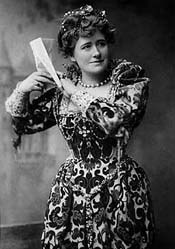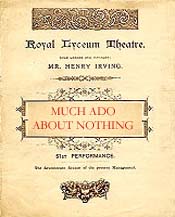 Many
actors in the nineteenth century were regarded with tremendous respect and esteem
but it is unlikely that any performer engendered the affection that Ellen
Terry (1849-1928) received. Audiences didn't just admire her, they loved
her. She was born into a theatrical family that evolved into a dynasty (John
Gielgud was her great nephew), making her London debut as MamilIius opposite
Charles Kean's Leontes in The Winter's Tale in 1856. She graduated into
ingenue roles, and in 1867 acted opposite Henry Irving for the first time as
Katharina in a shortened version of Taming of the Shrew. She joined Irving
at the Lyceum Theatre in 1878, starting the greatest acting partnership of the
nineteenth century. While Irving was sometimes criticized (most frequently by
George Bernard Shaw, with whom Terry shared a loving correspondence for many
years) for taking the most prominent roles that kept Terry in the background,
she was able to play almost all of the major Shakespearean female roles - provided
that there was a prominent enough part for Irving. Their greatest triumphs were
usually shared: Portia and Shylock, Hamlet and Ophelia, Queen Katharine and
Wolsey. She was devoted to Irving, and only after his death in 1905 did she
finally appear in the play Shaw wrote for her, Captain Brassbound's Conversion.
Many
actors in the nineteenth century were regarded with tremendous respect and esteem
but it is unlikely that any performer engendered the affection that Ellen
Terry (1849-1928) received. Audiences didn't just admire her, they loved
her. She was born into a theatrical family that evolved into a dynasty (John
Gielgud was her great nephew), making her London debut as MamilIius opposite
Charles Kean's Leontes in The Winter's Tale in 1856. She graduated into
ingenue roles, and in 1867 acted opposite Henry Irving for the first time as
Katharina in a shortened version of Taming of the Shrew. She joined Irving
at the Lyceum Theatre in 1878, starting the greatest acting partnership of the
nineteenth century. While Irving was sometimes criticized (most frequently by
George Bernard Shaw, with whom Terry shared a loving correspondence for many
years) for taking the most prominent roles that kept Terry in the background,
she was able to play almost all of the major Shakespearean female roles - provided
that there was a prominent enough part for Irving. Their greatest triumphs were
usually shared: Portia and Shylock, Hamlet and Ophelia, Queen Katharine and
Wolsey. She was devoted to Irving, and only after his death in 1905 did she
finally appear in the play Shaw wrote for her, Captain Brassbound's Conversion.
 Her
greatest Shakespearean role was Beatrice in Much Ado About Nothing, which
she first played (opposite Irving's Benedick) in 1882 and was included in her
repertory for years. When her partnership with Irving ended in 1902 and Terry
finally struck out on her own, Oscar Asche took over the role of Benedick and
her sets were designed by her remarkable son Edward Gordon Craig. But it was
Terry who the public continued to come to see. Max Beerbohm wrote that "...there
never has been, nor there never will be, so perfect a Beatrice as Miss Terry,
and Miss Terry never will be, nor ever has been, so perfect than as Beatrice.
Beatrice, on all her sunniness and jollity; a tease, a romp; a woman with something
beyond her generous womanhood.- some touch of fairydom in her - here is she
incarnate and unrivalled."
Her
greatest Shakespearean role was Beatrice in Much Ado About Nothing, which
she first played (opposite Irving's Benedick) in 1882 and was included in her
repertory for years. When her partnership with Irving ended in 1902 and Terry
finally struck out on her own, Oscar Asche took over the role of Benedick and
her sets were designed by her remarkable son Edward Gordon Craig. But it was
Terry who the public continued to come to see. Max Beerbohm wrote that "...there
never has been, nor there never will be, so perfect a Beatrice as Miss Terry,
and Miss Terry never will be, nor ever has been, so perfect than as Beatrice.
Beatrice, on all her sunniness and jollity; a tease, a romp; a woman with something
beyond her generous womanhood.- some touch of fairydom in her - here is she
incarnate and unrivalled."